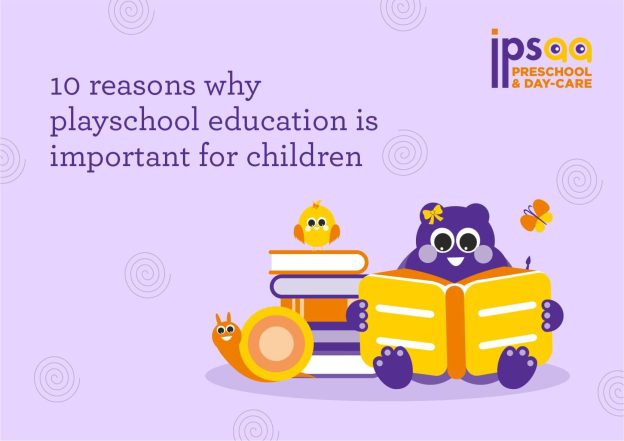Playschool education is an essential part of a child’s development, as it provides them with the foundation they need to succeed in their future academic and social pursuits. This type of education is designed specifically for young children, and it focuses on providing them with the tools and experiences they need to grow and learn.
10 reasons why playschool education is important for children
Creativity
Playschool education is also beneficial because it helps children develop their creativity and imagination. Children at this age are naturally curious and eager to explore the world around them. Playschool education provides children with opportunities to explore and create, which helps them develop their creativity and imagination. This is important for children as they grow and develop, as it will help them think outside the box and come up with unique ideas and solutions.
Cognitive Skills
One of the most important benefits of playschool education is that it helps children develop their cognitive skills. This includes things like problem-solving, critical thinking, and memory retention. These skills are crucial for children as they learn more complex subjects in school. For example, playschool education can help children learn how to count, identify shapes, and understand basic concepts like colors and sizes. These basic concepts are the building blocks for more advanced learning in the future.
Social Skills
Another important benefit of playschool education is that it helps children develop their social skills. Children at this age are learning how to interact with others, and they need to learn how to share, take turns, and communicate effectively. Playschool education provides children with opportunities to interact with other children and learn these important social skills. This can help children feel more comfortable in group settings, which will be important as they move on to more advanced levels of education.
Physical Skills
In addition to cognitive and social development, playschool education also helps children develop their physical skills. Children at this age are learning how to coordinate their movements, and playschool education provides them with opportunities to practice these skills. This can include activities like climbing, running, and playing with educational toys. These activities help children develop their gross motor skills, which are important for activities like sports and other physical activities.
Confidence
Another important benefit of playschool education is that it helps children develop their self-esteem and confidence. Children at this age are learning to trust themselves and their abilities, and playschool education provides them with opportunities to feel successful and proud of their accomplishments. This can include things like completing a puzzle, drawing a picture, or making a craft. By feeling successful in these small ways, children develop a sense of self-worth and confidence that will help them as they move on to more advanced education.
Love for Learning
Playschool education is important because it helps children develop a love for learning. Children at this age are naturally curious and eager to learn, and playschool education provides them with opportunities to explore and discover. This can help children develop a love for learning that will stay with them throughout their lives. When children learn to love learning, they are more likely to be successful in school and in other areas of their lives.
Language Skills
Another benefit of playschool education is that it helps children develop their language skills. Children at this age are learning to communicate and understand language, and playschool education provides them with opportunities to practice these skills. This can include activities like reading stories, singing songs, and participating in the conversation. These activities help children develop their listening, speaking, and vocabulary skills, which are essential for their future academic success.
Emotional Intelligence
Playschool education also helps children develop their emotional intelligence. Children at this age are learning to understand and manage their emotions, and playschool education provides them with opportunities to practice these skills. This can include activities like learning how to identify and express their feelings and learning how to regulate their emotions. These skills are essential for children as they grow and develop, as they will help them navigate the complex social interactions they will encounter in the future.
Fine Motor Skills
Another benefit of playschool education is that it helps children develop their fine motor skills. These are the small muscle movements that are used for tasks such as writing, cutting, and buttoning. These skills are important for children as they progress through school, as they will need to use them for activities such as writing, using scissors, and using computer keyboards. Playschool education provides children with opportunities to practice these skills through activities such as drawing, coloring, and using play dough. These activities not only help children develop their fine motor skills but also helps them develop their creativity and imagination.
Self-Regulation
Playschool education can also help children develop their self-regulation skills. Self-regulation refers to the ability to control one’s own behavior, emotions, and attention. It is a critical skill for children as they grow and develop, as it will help them navigate the complex social interactions they will encounter in the future. Playschool education provides children with opportunities to practice self-regulation through activities such as taking turns, following rules, and learning to share. It also teaches children to listen and follow directions, which will help them in their future academic and personal pursuits.
Other features
Additionally, playschool education provides children with a safe and nurturing environment. Children at this age are still learning to trust the adults around them, and playschool education provides them with a supportive and safe environment where they can grow and learn. Another aspect of playschool education is the role of play. Play is a natural and important aspect of a child’s development. It allows them to explore, experiment, and make sense of their world. Playschool education provides children with a sense of belonging and community. Children at this age are learning about their place in the world, and playschool education provides them with opportunities to feel connected to others. This can include things like participating in group activities and learning about different cultures and traditions.
Conclusion
In conclusion, playschool education is an essential part of a child’s development, it is not only a stepping-stone to formal education, but it is also an important period of growth and development in its own right. It provides children with a safe and nurturing environment, where they can develop their cognitive, social, physical, emotional, and language skills. It also helps children develop their creativity, imagination, self-esteem, and confidence. It helps them develop a love for learning and a sense of belonging and community. Playschool education is the foundation of a child’s future academic and personal success, and it is important for parents to provide their children with the best opportunities for learning and growth during this critical period of their development.


